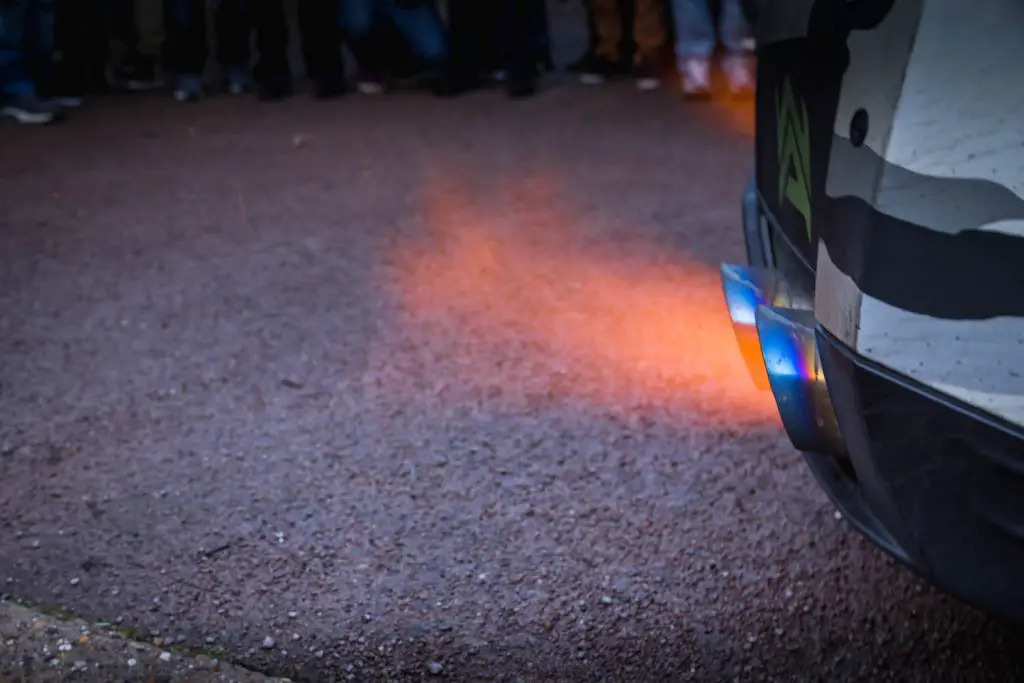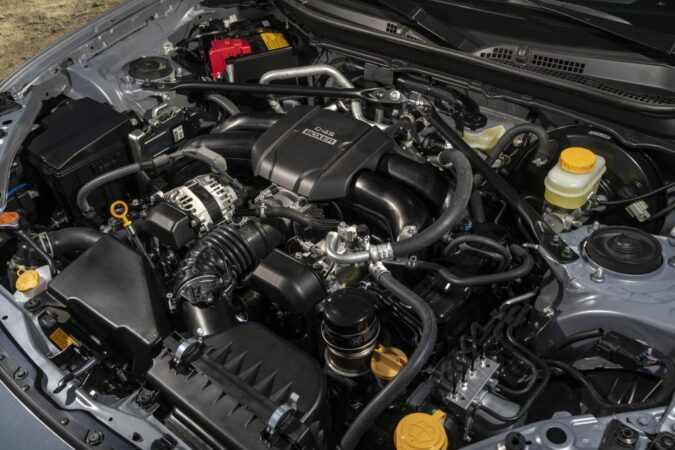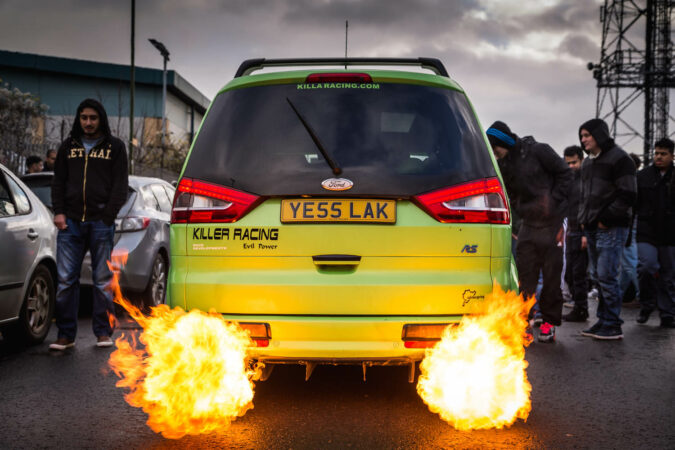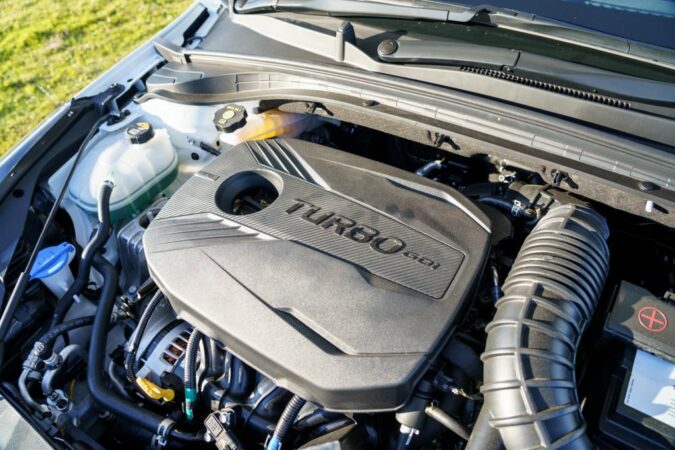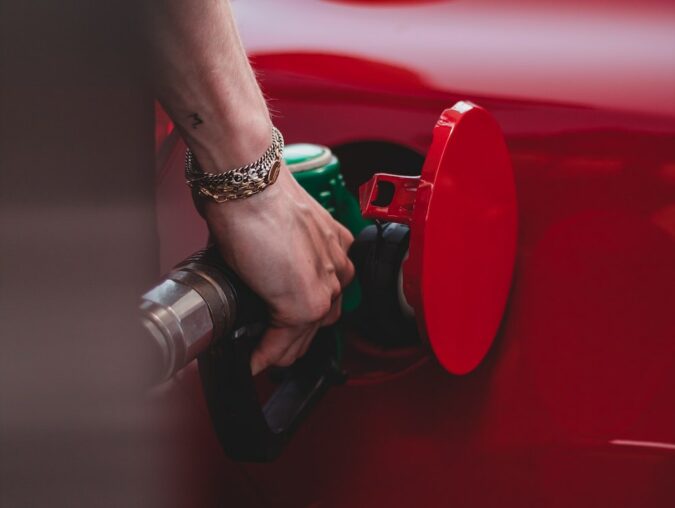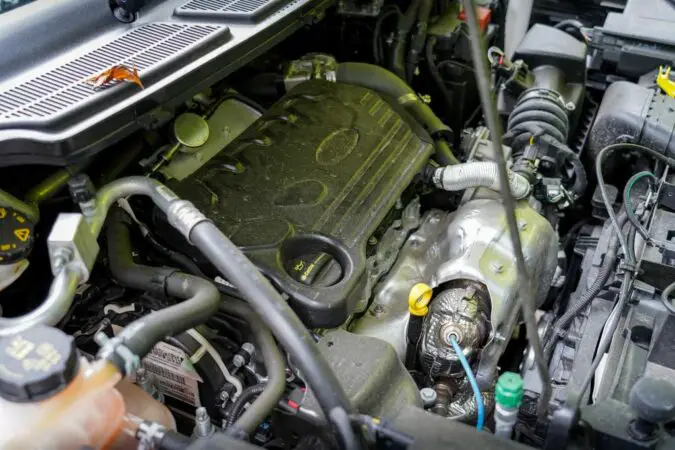Did you ever hear a loud sound coming from your vehicle? Something like a firecracker, when you are just revving down the road or perhaps nearing a stoplight? It might be because of a car backfire, and that’s what we’ll cover today. Did you hear a loud noise coming from the hood of your car when you are out driving? It might be because of the car’s backfire. Read to know more.
You are probably wondering what happened. If it was your engine, or is it that your vehicle is somehow damaged. However, the most likely cause is that your vehicle is just backfiring.
It is quite common for backfire to occur from your exhaust, it is nothing new. It did however become a lot easier ever since the invention of ECU tuning. And of course, a few other factors play roles as well.
Today, we are going to talk about car backfires and why it happens. We’ll also cover if it is legal. And also the reason why many car owners like to have their car tuned. They do it in a way that would cause it to backfire.
How Does The Engine Of Your Car Work?
We need to first know how the engine of your car works. Let’s talk a bit more professionally about a four-stroke cycle engine. Also, the four stages that we need to know about are:
- Intake: This is when the air/fuel mixture gets drawn into your car
- Compression: When the mixture of the air/fuel is compressed
- Power: The piston is forced to go down due to the explosion
- Exhaust: The burned gases are pushed back out by the piston
You could feel like it’s a bit too much for you to remember and understand, and it’s completely alright. There is a simpler way to look at this and keep it in mind.
So, the main thing that you need to know about this is that there are four stages. And we can also call them to suck, squeeze, bang, and then blow.
The first stage, suck, is when your car is sucking in the fuel and mixing it up. It does it with the air to get the perfect ratio. Then that mixture is compressed by your engine with the help of the pistons. The pressure goes up as the piston is reducing the available volume in the cylinder.
What happens next is that the mixture is ignited by a spark plug. Which then blows it up in an explosion that is of course controlled.
This exploding gas then finally goes and blows into the crankshaft of your car. Thus giving your car the necessary power that it requires to move and turn its wheels.
Backfire Meaning
Backfire happens when there is still unburnt fuel left in your exhaust system. When that unburnt fuel heats up, an explosion causes at a point that is not in your engine.
That explosion is what you hear as a gunshot or a firecracker going off. It happens when you are either accelerating or even decelerating. There are times that it can also be caused when you are just starting up your car.
If that burst of fuel in your car starts to get hot, it will explode super loud. It might sound like a gunshot. And it might even have your car shooting out flames from the back of it.
The steps with the engine that we talked about previously, are also another reason why your car might backfire.
What if the spark plugs in your car are randomly going off without a proper sequence? Or if the timing is messed up, both these reasons can cause your car to backfire.
What Do Backfires Sound Like?
You might be confused as to what backfires sound like. And you would not be the first person. When you hear a noise coming out of your car, your first thought would not be your engine backfiring.
Backfires normally sound similar to gunshots. You could also compare them to a firecracker going off. The sound of a good backfire is hard to get, it is like fine wine.
It does need to be nice and loud. However, it should not be so loud that it blows out the eardrums of your friend.
If you want to tune your car, then you need to have a little bit of extra fuel. This allows for the excess fuel out of the back of the exhaust system of your car.
So, you are letting off the accelerator of the car. And you might also want there to be a little bit of burble. It would cause the RPMs to drop of course. But, it would leave the fuel flowing through your car’s exhaust system.
With this, you can get that amazing sensation of the burbles. And get a sound that satisfies your heart when you are hearing it from the driver’s seat. If you are still unsure of the sound of a backfire, then you can look at this.
What Causes Your Engine To Backfire?
We already know how the engine of a car works, and what backfires are. And also what they should sound like. Now it is time that we learn more about your car backfire. We have some of the most common reasons below.
Car Backfire: Valves Being Bent Or Deformed
When you look at each cylinder, you will at least come across one intake valve and one exhaust valve. The intake valves are the ones that open and close to let air and fuel in. It does this while the exhaust valves are also open.
These valves can have proper sealing. This helps them to facilitate a combustion cycle that is possibly the most efficient.
So, what if the valves get bent or if the seals wear out? The seal won’t keep the fuel from getting into the cylinder when you do not want it to. You will have some extra fuel present in your exhaust gases.
Compare them to a “rich” mixture of air/fuel. If the valves in your car bend, then this might be an irregular amount. The good thing is that your car is most likely not backfiring from bent valves. This is a very costly repair if you take it to your mechanic.
Of course, this is likely not the main reason. Because bent valves mostly come from your engine having a problem with timing. Before your valves cause a backfire, you will likely find the timing chain or belt not working.
Car Backfire: Ignition Having A Bad Timing
Spark plugs are very essential to the process of ignition. And hopefully, the spark plugs in your car are only firing when you have closed valves. This results in the most efficient burn that you can get.
Something to keep in mind is that when the timing of your ignition is off, the fuel inside will burn when one of the valves is still just opening or just closing. It causes an amount of fuel to be expelled through the car’s exhaust system.
If there’s a lot of fuel moving through the red hot headers, they will ignite and cause an explosion. That will pop through the exhaust system in your car.
Car Backfire: Rich Air/Fuel Mixture
What we mean by saying rich air/fuel mixture is that when you have a lot more fuel in the air/fuel mixture it is referred to as running rich. What if you want to maintain the combustion in your car engine that is the most efficient? Then you need to have a perfect ratio of air to fuel in your mixture.
If you can maintain this, then you can easily improve the longevity of the engine and it will of course also cost you less going down the road.
You need to also bear in mind that having a rich ratio of air to fuel means that you are sending a lot of fuel into the cylinder, thus resulting in a burn that is not complete.
As you already know from the possibilities that we discussed before, this also means that fuel will move to the exhaust valve in your car. This excess fuel will then ignite in the exhaust of your car. This will cause you to hear a loud popping sound from the driver’s seat of your car.
When this pop happens, you are making a break in the flow of the exhaust, and this will give you a tiny bit of lapse in acceleration. You can feel this bit of acceleration.
Your car will most likely start to feel somewhat sluggish, and you will not be able to race as well in the streets. Always remember that an efficient engine runs smoothly, and an engine that can run smoothly can go fast.
Car Backfire: Lean Air/Fuel Mixture
If the fuel injectors in your car clog up, the fuel pump in your car is failing or even if the fuel filter has gotten dirty, that means you will most likely start developing a mixture of lean air/fuel in the combustion cycle.
What we mean by “lean” here is that there is not enough in the system to burn all of the fuel in the cylinder within time so that proper combustion can take place.
All of it is about maintaining the correct balance of air, fuel, and spark in your system. If even just one of those elements is lacking in whatever way, the engine of your car will turn on the Check Engine Light. This also of course causes the excess fuel to come popping out through the exhaust system of your car.
Car Backfire: Engine Timing Being Defective
For the engine of a car to be in an optimal functioning state, the components of the engine must be working with at least some level of precision. The precision of the engine, or the engine timing, is regulated with the help of a timing chain that is needed to be in top condition all the time.
When a timing chain fails it causes the valve intakes to open and close at improper timings and it might also cause the sparks that are necessary for the ignition to be going off at the wrong times.
A faulty engine time can hurt the ratio of air to fuel mixture, thus leading to the engine of your car backfiring.
Car Backfire: Defective Fuel System
The fuel system of a car is made up of multiple different components, and these have the chance of going bad at any time.
If there is a defective part in there then it will affect the functions of the whole system itself. For example, the fuel pump goes bad or the fuel filter gets clogged.
There will either be a dip or a hike in the pressure of the fuel. This will affect the fuel mixes, resulting in your car engine backfiring.
A fuel injector that has gone bad is also able to supply different amounts of fuel into the cylinder, which would eventually lead to incorrect fuel to air ratio in the cylinder causing the car to either backfire or sputter.
Car Backfire: Faulty Oxygen Sensor
The main job of the oxygen sensors in your car is to make sure that the air/fuel mixture in the engine is at an optimal ratio.
With a broken oxygen sensor you will be getting the wrong signals. This will ultimately affect the mixture of air/fuel in the combustion and will cause your car to backfire.
Car Backfire: Faulty Distributor Cap
To dispense the electric pulses to the spark plugs of the car, distributor caps are used along with wire sets. When a distributor cap is faulty or goes bad, then it runs a high chance of letting the moisture in. Due to this, when the exhaust valve is open the spark goes into the wrong cylinder.
Car Backfire: Problems With The Spark Plugs
Carbon tracking is one of the most commonly seen problems with the spark plugs in your car. It is quite likely to happen when sparks are generated from the wires of the distributor’s cap. These sparks can move from one wire to the other and can cause carbon track.
There is another problem that might occur when the ignition coils or the wires of the spark plugs are attached directly to the spark plug.
This produces an electrical spark that can split the paths leaving some of the fuel behind in the cylinder of the engine. The following sparks will then hit the leftover fuel, causing the car to be backfiring even while the exhaust valve is open.
Car Backfire: Bad Air Filter
When an air filter is blocked it prevents the proper amount of air from getting into the engine of the car.
If the engine is unable to get the necessary amount of air, then it increases the chances of having an air/fuel mixture that is rich. As we have already talked about it, we know that it leads to the engine backfiring.
Moreover, engine backfires can also actually be caused due to dirty filters. This happens since the dirt is inhabiting the proper flow of air in the air filter.
If that is not enough for you, this also increases the chances of some sort of contaminants getting into the mixture of fuel and thus affecting the process of the combustion.
How You Can Fix The Backfires
So you want to stop your car from backfiring. Well, the good news for you is that once you have figured out what exactly is the cause of the backfiring issue, you can always get the issue fixed.
So, here are some of the most common fixes for your car backfire.
1. Fix the Oxygen Sensors
As we discussed earlier, one of the reasons that your car might have some issues with backfiring is a damaged or broken oxygen sensor.
If you are certain that the problem is with the oxygen sensors in your car then getting them replaced as soon as possible would likely fix your backfiring issues.
2. Get The Engine Timing Belt Changed
When it comes to maintaining the precision in the functions of the parts of an engine, the timing belt plays a very important role. Just run a visual inspection on the belt to make sure that it is still in proper working condition.
You will know that it is time to change it when you notice that it is going bad, is torn, or even frayed.
3. Check The Spark Plugs
When the spark plugs in your car are faulty it tends to affect the way the mixture of air and fuel in the cylinder of the engine is burned.
This is why you need to check the spark plugs to ensure that there is no buildup of carbon or any type of corrosion (once you figure out how to read spark plugs) that might make the spark plugs go bad.
If these are the same things that you are noticing then it is probably worth replacing your spark plugs to check if it fixes your backfiring issues.
4. Check The Fuel System
Remember that vital parts of basically all automobile fuel systems are the fuel injectors, fuel pump, and of course the carburetor. It is very important to make sure that both of them are sending an optimal or a proper amount of fuel into the intake for the air.
However, remember that if the carburetor has not gone bad then the chances are that you just need to clean or adjust it. If it has gone bad then you would most likely need to replace it altogether or rebuild the whole thing.
Of course, the same concept applies to both the fuel pumps and fuel injectors as well. They might also need to get some checking and cleaning done. Perhaps if necessary, you might also need to have them replaced.
Frequently Asked Questions (FAQs)
What Causes A Car To Backfire
As we have talked about above, there are quite a few reasons that could cause a car to backfire. Some of the most common ones are – bent or deformed valves, ignition timing being bad, rich or lean air/fuel mixture, bad timing of the engine, and a faulty fuel system.
What Makes A Car Backfire
We have already discussed many things that can make a car backfire. Some of them would be, having a bad air filter, spark plug problems, a distributor cap being faulty, or a broken oxygen sensor.
How To Make Your Car Backfire
There are a lot of people who make their car backfire on purpose. If your vehicle is on the older side with a naturally aspirated engine, then getting it to backfire is pretty simple. You could also try turning your ECU, trying to hit higher RPMs constantly, removing the muffler part from your exhaust, getting a performance muffler substituted, or adding an anti-lag to a turbo car to get your car to backfire.
Why Does A Car Backfire
One of the many reasons behind a car backfiring, the biggest one is there being unburnt fuel left in the cylinder of the engine. This causes the unburnt fuel to come out of the exhaust as a backfire.
What Causes A Car To Backfire On Acceleration
There could be many reasons behind this, but the most likely ones seem to be a faulty spark plug and improper airflow in the engine.
What Causes A Car To Backfire On Deceleration
When a car is decelerating, backfire is caused mostly due to the ignition of the unburnt fuel in the exhaust causing the exhaust to backfire.
Final Words
There are many reasons behind a car’s backfiring, however, if you want to fix the backfiring issue of your car, it is quite doable as long as you know what’s causing it.
We hope that this helped you understand the mechanics of your car a lot better and also how to deal with backfires in your car!

